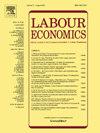主观失业预期和(自我)保险
IF 2.2
2区 经济学
Q2 ECONOMICS
引用次数: 0
摘要
我们研究了主观失业预期及其对经济行为的影响。我们利用一个纵向数据集,将调查得出的主观失业预期与有关收入、储蓄和失业保险的行政数据相结合。我们的研究结果表明,主观预期对随后的失业经历具有宝贵的预测信息。我们发现,个人往往会高估自己的失业风险。此外,较高的失业预期会导致参加失业保险和积累流动储蓄的可能性增大。本文章由计算机程序翻译,如有差异,请以英文原文为准。
Subjective unemployment expectations and (self-)insurance
We study subjective unemployment expectations and their influence on economic behavior. We utilize a longitudinal data set combining survey elicited subjective unemployment expectations with administrative data on income, savings, and unemployment insurance. Our findings indicate that subjective expectations hold valuable predictive information about subsequent unemployment experiences. We find that individuals tend to overestimate their risk of unemployment. Moreover, higher unemployment expectations lead to a greater likelihood of enrolling in unemployment insurance and accumulation of liquid savings.
求助全文
通过发布文献求助,成功后即可免费获取论文全文。
去求助
来源期刊

Labour Economics
ECONOMICS-
CiteScore
3.60
自引率
8.30%
发文量
142
期刊介绍:
Labour Economics is devoted to publishing research in the field of labour economics both on the microeconomic and on the macroeconomic level, in a balanced mix of theory, empirical testing and policy applications. It gives due recognition to analysis and explanation of institutional arrangements of national labour markets and the impact of these institutions on labour market outcomes.
 求助内容:
求助内容: 应助结果提醒方式:
应助结果提醒方式:


